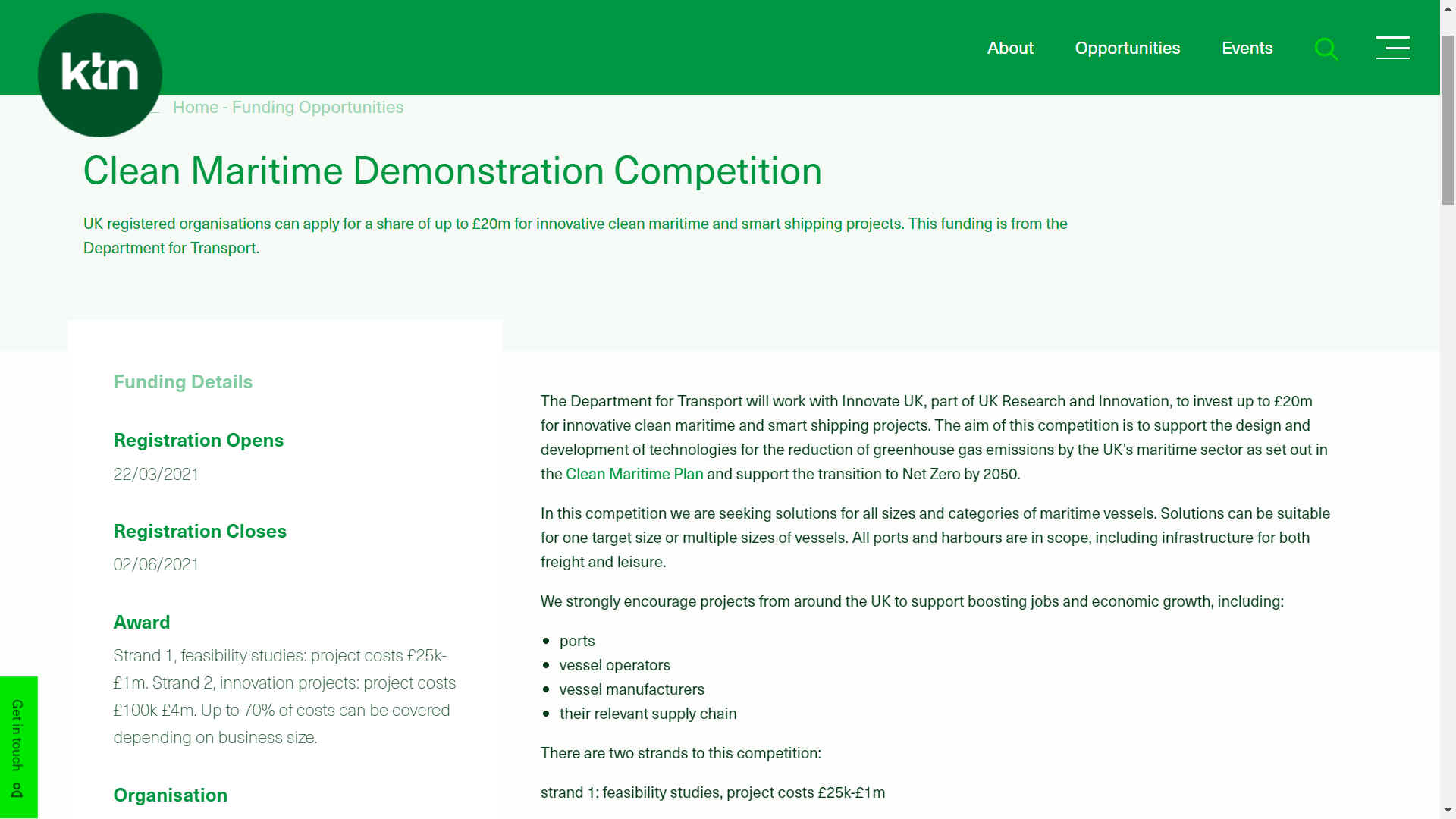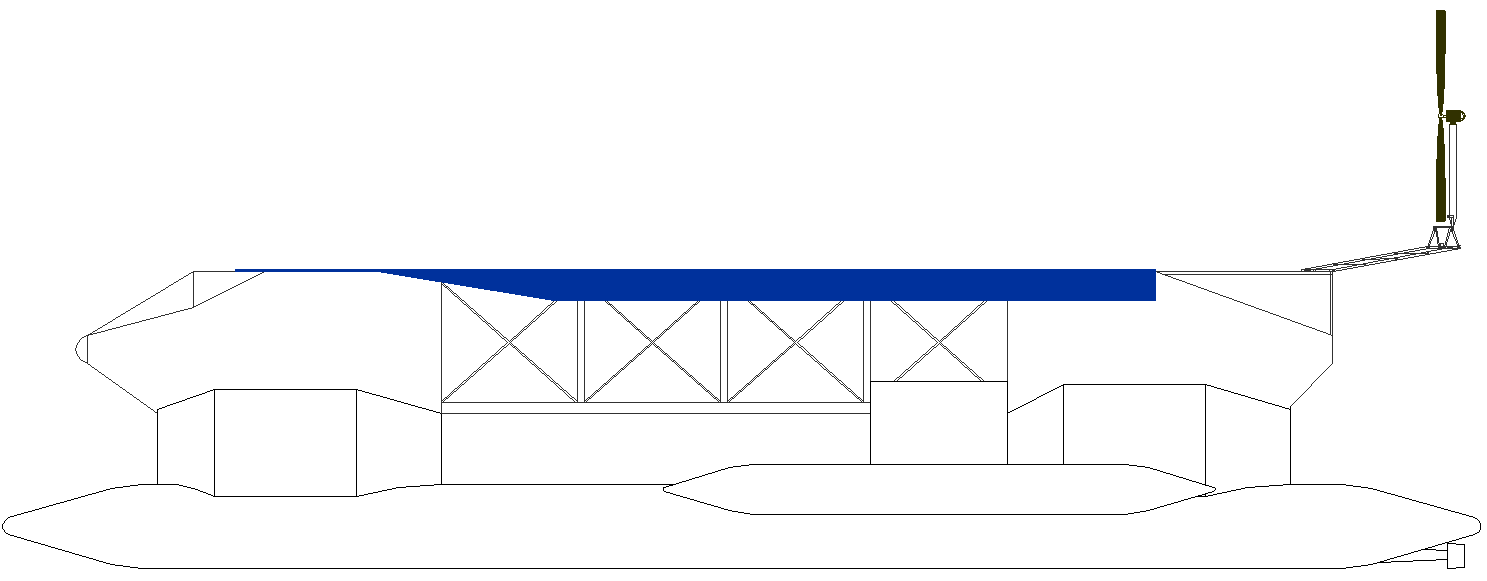
..
Registration Opens:
22/03/2021 - Registration Closes: 02/06/2021
Your project must:
Have total eligible costs between £25,000 and £1,000,000.
Projects
must start by 1 September 2021, last up to 7 months and end by 31 March 2022.
Your proposal
The aim of this competition is to support the design and development of technologies for the reduction of greenhouse gas emissions by the UK’s maritime sector as set out in the Clean Maritime Plan and support the transition to Net Zero by 2050.
Your project must:
- review the technical and economic feasibility of solutions to reduce greenhouse gas emissions
- develop a clear plan for a future technology demonstration to be deployed after the feasibility project has been completed
You can include autonomous vessels as identified in the Technology and Innovation in
UK Maritime Route Map and wind power, where these deliver energy efficiency savings and enable a vessel to be zero emission capable.
Project consortia for the feasibility study can include the necessary partners in the feasibility study to achieve these aims, such as including a representative end user such as a vessel manufacturer, operator or port or harbour authority.
At the end of the feasibility project, you must:
- produce a clear, detailed and costed plan for how the solution will be demonstrated in an operational setting in a port or on a vessel(s), including its technical approach, its objectives and business case
- detail your compliance with regulation or how you will provide assurance if your novel technology does not comply with existing regulation
- quantify the potential reduction of lifecycle emissions and positive economic impacts in the future
- detail the barriers to adoption that the future demonstration will overcome
- detail the resources needed to carry out such a large-scale demonstration, including funding requirements and timescales for delivery, planning permissions, implications of current and future regulation, an assessment of new partners needed and other related information that is required to make a clear business case and decision on deploying a large demonstration project
-
share your reports with DfT and Innovate UK
Clean maritime and smart shipping technologies for all sizes and categories of maritime vessel are in scope. Solutions can be suitable for one target size of vessel or multiple.
Leisure and commercial vessels are in scope.
All ports and harbours are in scope, including infrastructure for both freight and leisure.
We strongly encourage projects from around the UK to support boosting jobs and economic growth, including from ports, vessel operators, vessel manufacturers and their supply chain. These can be from established areas of maritime innovation in the UK with proven expertise and capabilities, this includes emerging clusters of activity in
zero emission technologies such as but not limited to:
- the Orkney islands, home to a series of innovative hydrogen projects, including ongoing trials with a vessel, and is an internationally recognised centre of excellence for renewable energy, advanced fuels and island decarbonisation
- Teesside, home to the Department of Transport’s Hydrogen Transport Centre, complementing the existing Tees Valley Net Zero Innovation Centre and leveraging local expertise in heavy industry, advanced manufacturing and high technology research and development
Applications must clearly demonstrate how they will anchor IP generated by the project in the UK and how it will be exploited for the benefit of the UK supply chain in the future.
We want to fund a portfolio of
projects, across a variety of technologies, markets, geographic locations around the UK, technological maturities and research categories. Innovate UK and DfT reserves the right to prioritise projects within specific themes where necessary.
SPECIFIC THEMES
Your project can focus on one or more of the following themes:
On vessel low and zero emission technologies:
- vessel propulsion (battery,
fuel
cell, hybrid, or engines using low carbon alternative fuels such as hydrogen, methanol or ammonia)
- propulsion systems using internal combustion engine technology capable of using multiple fuels including
zero carbon options (such as hydrogen, methanol, ammonia)
- wind propulsion, including soft-sail, fixed-sail, rotor, kite and turbine technologies, targeting a range of ship types from small vessels to large cargo carriers, both as primary and auxiliary propulsion
- on-vessel power generation and fuel production to reduce GHG’s e.g. wind turbines, solar panels, synthetic fuel production
- low carbon energy storage and management
- physical connections to shore-side power, including fuelling lines
- enabling technologies such as motors, drives and power electronics
Port and shore-side solutions:
- shore-side low and zero carbon fuelling including bunkering of such fuels
- charging infrastructure and management
- low and zero emission shore-side power solutions, such as enabling docked vessels to turn off their conventional power supply for ancillary systems
- shore-side renewable energy generation at the port to supply vessels
- zero emission shore-side power supply as vessels are in harbour for the vessel’s main propulsion system, including grid or renewable energy supply
- low carbon fuel production (such as hydrogen, methanol, ammonia)
- zero emission infrastructure, including stationary assets for freight handling and port
operations
Investigating green shipping corridors between the UK and other trading partners:
-
assessing the potential of specific technologies in decarbonising trade routes between the UK and trading partners, geographically both near and far
-
exploring barriers to the decarbonisation of trade routes
-
exploring how innovative technologies or the novel application of existing technologies will address the barriers, enabling the creation of green corridors between the UK and its trading partners
Smart shipping technologies:
- autonomy, digitisation and better journey efficiencies directly and indirectly, delivering quantifiable energy efficiency savings and, therefore, GHG emission reductions
-
other smart shipping technologies, including the control of the emission reduction systems including but not limited to wind propulsion
Research categories
We will fund, feasibility projects, as defined in the
guidance on categories of
research.
PROJECTS WE WILL NOT FUND
We are not funding:
- projects that focus only on increasing the efficiency of current conventional fossil fuels and powertrains of maritime vessels
- projects involving aqua culture
- projects focused on marine conservation and ecology, such as mapping the sea floor etc
capital investment only projects
- projects investigating the feasibility of financial products, including green finance
- projects focused on biofuels, except for projects strictly focused on inland waterway vessels and Non-Road Mobile Machinery (NRMM), which includes port-side machinery
- projects focused on nuclear propulsion
- projects dependent on export performance - for example giving a subsidy to a baker on the condition that they export a certain quantity of bread to another country
- projects dependent on domestic inputs usage - for example if they insisted that a baker use 50% UK flour in their product
APPLY: STRAND 1 (feasibility studies, £25k-£1m)
SUMMARY
- ELIGIBILITY -
SCOPE -
HOW TO APPLY -
SUPPORT
- COSTS
- EDGE
APPLY: STRAND 2 (innovation projects, £100k-£4m)
SUMMARY
- ELIGIBILITY - SCOPE - HOW TO APPLY - SUPPORTING INFO

SDGs
13
CLIMATE & 14
OCEANS : The
Elizabeth Swann is shown above is a zero emissions vessel, designed to
use only
solar and wind power for propulsion, to help nations meet their sustainability
development goals (SDGs), as per the Accord
de Paris in 2015.
CLEAN
MARITIME PLAN INTRODUCTION: 1 - 13
SECTION 1 - TACKLING
EMISSIONS:
14
- 50
SECTION 2 - OUR APPROACH:
51 - 58
SECTION 3 - ECONOMICS:
59 - 95
SECTION 4 - INFRASTRUCTURE:
96 - 120
SECTION 5
INNOVATION: 121 - 129
SECTION 6 -
REGULATION: 130 - 138
SECTION 7 - NEXT
STEPS: 139 - 140
MAP - THE 2050 PLAN RECOMMENDATIONS
GLOSSARY
END
NOTES REFERENCE LINKS
The Department for Transport will work with
Innovate
UK, part of UK Research and
Innovation, to invest up to £20m for innovative clean maritime and smart shipping projects. The
Secretary of State in 2018 was Chris
Grayling, Minister for Marine, Nus
Ghani, and Sec. of State from 2019, Grant
Shapps.
HORIZON EUROPE
Horizon Europe is the EU's
€100 billion euro research and innovation programme, the European
equivalent of UKRI, 35% of which is allocated to achieving climate
objectives under SDG13, but where funding applications are extremely
complicated - and SMEs inevitably fall at the administration and finance
hurdle.
LINKS
& REFERENCE
https://en.wikipedia.org/wiki/Department_for_Transport
https://ktn-uk.org/opportunities/clean-maritime-demonstration-competition/
Please use our
A-Z INDEX to
navigate this site

